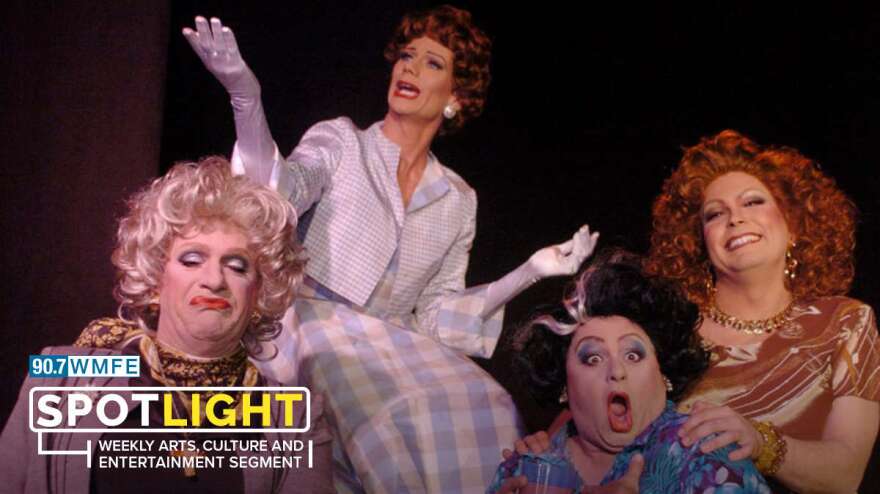Central Florida has many employees in the theme park and performing arts sector. And sometimes, circumstances beyond their control – like a hurricane or a pandemic – can hit them hard, if event venues close and audiences stay home.
Enter GOPAR – Greater Orlando Performing Arts Relief. It’s an organization dedicated to helping people who work in the performing arts industry where traditional safety net programs may fail.
GOPAR’s Laurel Clark tells WMFE's Nicole Darden Creston that the aid group is activated in the wake of Hurricane Ian.
Laurel Clark:
We know there was a lot of impact with Ian due to lost wages - everyone was shut down for a couple of days. And some people had personal disasters happen to them. And GOPAR is always available for people to apply if they're in the performing arts, and that includes onstage or offstage. And we just want everyone to know that we're fully funded right now, and we have money available if you need it.
Nicole Darden Creston:
So what did you do to get the information that you have? I see that you're connecting performers with resources. How did you find out about those resources?
Laurel Clark:
When we first formed back in 2020, for the pandemic, we partnered with St. Luke's [United Methodist Church] and St. Luke's is a church here in Central Florida, that helps other organizations distribute funds, and they were the way that we've distributed our funds this whole time. They also have community resources. And so when you apply to GOPAR, they're the people that actually vet the applications, and then distribute the money. As of now we're in the process of becoming our own 501 (C)(3), and when that is completed, we'll be doing it ourselves here in Central Florida.
Nicole Darden Creston:
I saw the links to [performing-arts-related aid organizations] that are helping performers. Did they have that information, or you did?
Laurel Clark:
We did. We had reached out to the Actors Fund to see if in the future, we could partner with them, and become part of their organization because they have a similar thing they do in New York and in Chicago and in LA. And we are currently talking to them about becoming part of that. They've changed their name, that's why it looks different. It's the Entertainment Community Fund now. And they have generously offered - we're really excited - they've generously offered to provide assistance to Central Florida. So that information is also on our web page, gopar.org.
Nicole Darden Creston:
Tell me how and why GOPAR got started.
Laurel Clark:
GOPAR was born out of a gathering of theater professionals that happened early in the 2020 pandemic. We were all connecting, trying to figure out how and when all the theaters would reopen. And we quickly realized there was going to be a need for some financial assistance for our community. We were going to be down for a long time. So a group of about 12 of us broke off and formed GOPAR. And it's not really "broke off" because those theaters are still partnering with GOPAR. And we were able to distribute [more than] $82,000 during the pandemic, to our performers in need. And we say "performing arts" because we want people to realize it's not just actors. It's also the backstage technicians, the directors, anyone who's earned money in the industry within the last two years can apply for assistance.
Nicole Darden Creston:
You mentioned partner organizations, tell me about Pass the Hat [fundraising program].
Laurel Clark:
Pass the Hat has been amazing. And that's why we still have money even though we've given away so much already. The Orlando Shakes has passed the hat and been able to raise $13,967 for GOPAR. A very similar amount was raised by the Garden Theatre under the direction of Joseph Walsh. And then St. Luke's has raised money for us. We've even had "Play in a Day" with Beth Marshall Productions - they gave us tickets from their proceeds and raised money for us. Ensemble Company at Penguin Pointe and Theater South, there's just been many of our partners that have passed the hat or given us proceeds from their ticket sales in order to provide funds for the Orlando community.
Nicole Darden Creston:
So there's one show or several shows that they designate as Pass the Hat shows and give a portion of that money to GOPAR.
Laurel Clark:
Right.
Nicole Darden Creston:
Got it! Now, of course, you don't have to give me any names, but do you know of some performing artists in Central Florida that are struggling with any of the after effects of Ian - floods in theaters or anything like that?
Laurel Clark:
Well, I think the important thing to say here is...we have a bigger problem in that I think people are hesitant to apply because they don't want people to know that they need assistance. And it's completely private. I don't have a clue who has applied and gotten funds. I won't ever know. That's how we do it. And I also think it's important to note that we aren't just Central Florida as in Orlando, we're "Greater Orlando," which includes Lake, Orange, Seminole, Volusia, Osceola, Brevard and Polk counties. So that means if you work at Legoland, you can apply. It reaches all the way to Volusia and we all know our west coast was greatly impacted, and I think there's still a lot of flooding over there. So I just want everyone to know that the funds are available and if you have any issues right now with lost wages or a medical emergency due to Hurricane Ian - and it doesn't have to be due to the hurricane, this is also here for personal issues that might arise as a entertainment professional to reach out to GOPAR.



